Dartmouth-Hitchcock Medical Center Development
Investing in talent
By Robyn E. Mosher
All photographs: Joseph Mehling
In the post-genomic era, with interdisciplinary exploration promising to unlock some of our most perplexing biomedical questions, physician- scientists are a critical societal resource. These enterprising people train as both medical doctors and researchers, in a joint M.D.-Ph.D. program. Their career goal is to combine medical practice with scientific research—taking their clinical knowledge of disease to the lab and transforming it into new surgical techniques, novel drug therapies, and high-tech treatments for serious illnesses like cancer, diabetes, heart disease, and many others.
Dartmouth's M.D.-Ph.D. program combines the rigors of the full medical curriculum with the systematic research preparation of the Ph.D. degree. It's an ambitious undertaking that can take seven or eight years to complete, but the rewards can be great.
"Dartmouth is one of only a small number of M.D.-Ph.D. programs that allow students to pursue their Ph.D. work in less conventional subject areas, such as computing or engineering," notes Ryan Lilien, now in his fifth year in the program. Lilien hopes that advances in bioengineering will lead to better treatments— for example by using implantable devices in people with diabetes to monitor their blood glucose levels and then to release insulin as appropriate.
Dartmouth's M.D.-Ph.D. program is training 29 physician-scientists, who combine coursework and clinical rotations with intensive Ph.D. research. Current students are doing research in cellular and molecular biology; computerized brain mapping; breast cancer imaging modalities; computer-aided drug design; the immune system's role in skin graft rejection; the spread of cancerous tumors; and the possible causes of osteoarthritis, cholera, endometriosis, and Alzheimer's.
|
While educational plans vary, students usually spend the first year or two within their graduate program meeting course requirements and initiating research training. They then spend the subsequent year or two completing the basic science courses in the M.D. curriculum and starting their dissertation research. Research training continues full-time during the summer months. After completing the basic science courses of the medical curriculum, most students will concentrate full-time on their thesis research and complete this before returning to the M.D. track to finish their clinical rotations. And then they still have to do from three to seven years of residency— and probably a year or two of fellowship on top of that.
What would motivate a student to commit to such a grueling program? For recent graduate Helen Barkan, it was the fact that "the practice of medicine is not quite science, not quite art. I felt that medicine would provide daily motivation for science . . . and it does."
But embarking on an M.D.-Ph.D. program is not only grueling and difficult, it can be expensive. Unlike at many universities, the medical school portion of Dartmouth's M.D.- Ph.D. program is not endowed and therefore cannot provide a stipend for students. This often results in an overwhelming economic burden for students, and it can sometimes mean students choose not to accept an offer of admission from Dartmouth.
But private philanthropy has the potential for helping DMS to augment this special program that trains new physician-scientists—tomorrow's leaders in scientific investigation as well as in the practical application of basic knowledge for improving the quality of life.
A recent endowment established by Gertrude F. Goff—known as "The Fund for the M.D.-Ph.D. Program at Dartmouth Medical School"— marks the beginning of such important support.
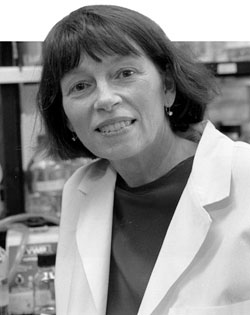
| |
|
Pictured above is Constance Brinckerhoff, a professor of biochemistry and the director of Dartmouth's M.D.- Ph.D. program. In the latter role, she oversees the work of future physician-scientists such as those pictured below—all of whom are either current students or recent graduates of the program. From the upper left, going clockwise, they are Ryan Lilien, Sholeen Nett, Jason Reynolds, and Helen Barkan. | |
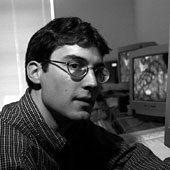 |
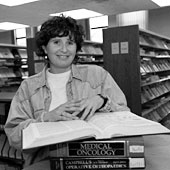 |
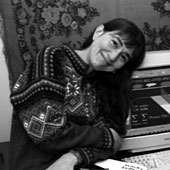 |
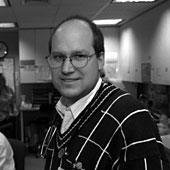 |
"Trudy's generous pledge will enhance our ability to keep the program vital and supportive for students," explains Constance Brinckerhoff, Ph.D., director of the program and the Nathan Smith Professor of Medicine and of Biochemistry at DMS. "It's a marvelous giving opportunity to endow the future of academic medicine by investing in these young and talented people."
One of those talented individuals is Andy Place, now in his fifth year in the program. Place is researching drugs that may prevent cancer. In 1992, when he was a 19-year-old college student, he found a suspicious lump in his neck and was diagnosed with Hodgkin's disease, a form of lymphoma.
Today, Place is cancer-free, but his experience inspired him to become a doctor and a cancer researcher. "I'm not afraid of cancer in the abstract sense, having experienced the disease firsthand," he explains, "so I approach it more aggressively."
He is testing novel chemoprevention drugs. "With cancer, we are beginning to understand what proteins and genes are involved in carcinogenesis. If we can design drugs that interact with these targets, we may prevent pre-malignancies from turning into frank carcinomas. Why treat the advanced stages of cancer," he asks, "if you can interrupt the processes that lead to it?"
Brinckerhoff plans to put the funds from the endowment toward student assistance, saying she would ultimately like to see the program be fully funded so students can make the decision to enroll based solely on their career interests rather than on financial viability. �
A society grows great when old men plant trees in
whose shade they know they shall never sit.
— Greek Proverb
A steward passes on

|
|
Jim Vail III |
James D. Vail III of Lake Forest, Ill., a 1950 graduate of Dartmouth College and a generous benefactor of Dartmouth Medical School, died on August 3.
Through the tenures of five DMS deans, Jim Vail and his wife, Peggy, were devoted supporters of the School. Vail was genuinely interested in stewarding the partnership that he and his family had developed with DMS over the years. In an interview just a few months before his death, he said, "When you get quiet time with the dean or other School leaders, . . . that's when you can see where they're looking, what they are reaching for. That's what helps us know what to do."
He did a great deal. With his wife, he had most recently established the Foster McGaw Vail 1978 Fellowship to support clinical teaching in memory of their deceased son. In addition, through the years, the Vail and McGaw families have funded the Andrew C. Vail Professorship, the James D. Vail, Jr., building on the Hanover campus, the Mary McGaw Laboratories, and more.
Vail was the stepson of Foster G. McGaw, whom his mother, Mary, married following his father's death. He worked for American Hospital Supply, a company founded by his stepfather, who was credited with revolutionizing the medical supply market by selling directly to hospitals rather than to physicians.
"Jim Vail and the Vail-McGaw families are important figures in the history of Dartmouth's medical school," says Ethan Dmitrovsky, acting dean of DMS. "We will miss Jim greatly. What his generous spirit gave us remains central to our life at Dartmouth, and for that we are indebted to him."
He is survived by his wife, Peggy, and sons Jim IV and John.
Robyn Mosher is a freelance writer based in the Upper Valley. She writes often about events at DMS and DHMC—including in this issue on pages 12 and 15.
